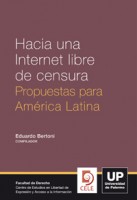 The right of every citizen to seek, receive and share information is protected both in the Universal Declaration of Human Rights and in the International Covenant on Civil and Political Rights (ICCPR). As regards Latin American countries specifically, the American Convention on Human Rights lays down rules on censorship in Article 13. Similarly, the Tunis Agenda also recognizes these rights within the Information Society.
The right of every citizen to seek, receive and share information is protected both in the Universal Declaration of Human Rights and in the International Covenant on Civil and Political Rights (ICCPR). As regards Latin American countries specifically, the American Convention on Human Rights lays down rules on censorship in Article 13. Similarly, the Tunis Agenda also recognizes these rights within the Information Society.
However, despite the fact that freedom of expression depends on the free flow of information, there is a tendency for national and regional laws to intervene in the end-to-end architecture of the Internet, prevent the free flow of information and thus undermine the rights of every citizen to freedom of expression and privacy. This context shows how utterly important it is to watch abusive Internet legislation worldwide. This is the intent of the book “Towards an Internet Free of Censorship”, published by CELE (Center for Research on Free Speech and Access to Knowledge), in which researchers Joana Varon Ferraz, Carlos Affonso Pereira de Souza, Bruno Magrani and Walter Britto participate with the chapter entitled “Content Filtering in Latin America: Reasons and Impacts on Freedom of Expression”.
Several Latin American governments and governments around the world, allegedly for the fight against piracy or the sake of security, have proposed legal texts that impose criminalization of legitimate expressions; liability of intermediaries; and disconnection of users on the pretext of violations to copyright or transmission of illegal information (such as pornography, drug trafficking, cyber attacks, etc.), or that simply establish arbitrary mechanisms to filter, block and remove content from the net and fail to provide an adequate protection of the rights to privacy and protection of personal data.
All these provisions are rather reprehensible, as they not only jeopardize the fundamental rights to privacy and freedom of expression of citizens, but also pose a threat to some of the key elements of the network architecture, such as neutrality and openness. No wonder yesterday’s movements have reached such enormous popularity, with more than 10 thousand websites shutting down in protest against SOPA – the subject is alive and kicking. Wikipedia, Google, Facebook, Mozilla, Wired, Reporters Without Borders, Greenpeace, IDEC and many others have joined the ranks of protesters.
As the Internet in nature knows no bounds, establishing regulations influences the freedom of expression and access to knowledge of the other countries; therefore, it is important that developing countries also define standards to be evaluated and discussed globally. While developed countries have already established a legal framework for the Internet, the movement in Latin America is still recent. This context provides more room for reflection, both if we observe the criticisms against foreign regulations, or if we strive to evaluate and think of access and freedom-related issues for our specific regional scenario.
The book is available for download here.
The English version of a few articles from the book are available here.




